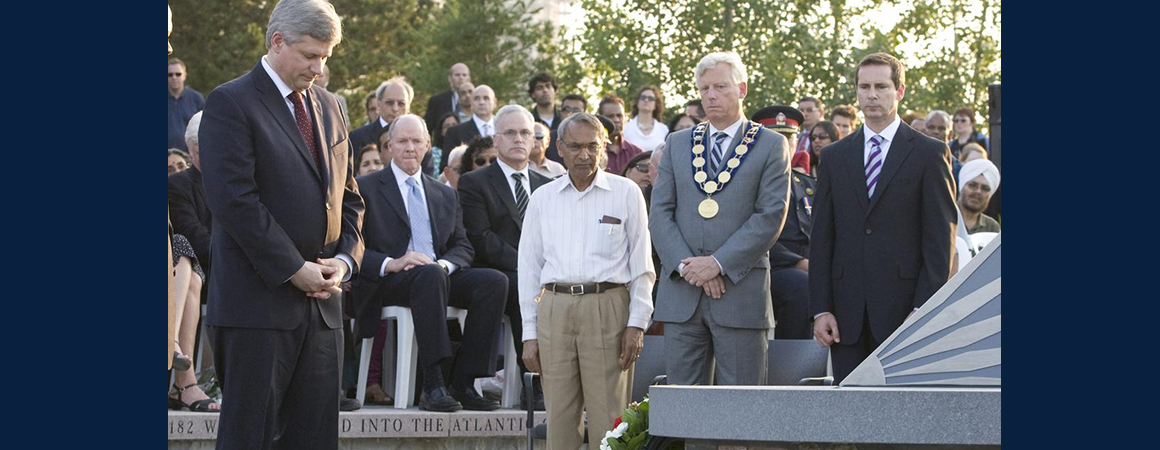In 2010, then Canada Prime Minister Stephen Harper apologised for the Kanishka bombing which was suspected to have been set off by Khalistani separatists operating from Canadian soil. Former diplomats say 2010 changed India-Canada relations, reversed now after PM Trudeau’s allegations
The story so far: As ties between India and Canada plummet to their lowest point since the 1980s, former diplomats say that a change in Canadian responses to the Khalistan issue are necessary for any future reset in ties, pointing to the 2010 apology by the then Canadian Prime Minister as an example. Addressing families of the victims of the 1985 Air India ‘Kanishka’ Flight 182 which exploded over the Irish coast after a bomb placed in the luggage went off, for which Khalistani separatist operatives were convicted, Canadian Prime Minister Stephen Harper said he was “sorry” on behalf of the Canadian government.
The apology
“Some wounds are too deep to be healed even by the remedy of time,” Mr. Harper said at the Air India memorial at Humber Bay Park in Toronto on the 25th anniversary of the terror attack, where he admitted for the first time that the bombing was an “atrocity conceived in Canada, executed in Canada, by Canadian citizens, and its victims were themselves mostly citizens of Canada.” Despite 280 of the 329 on board the Kanishka being Canadian citizens, the Prime Minister at the time, Brian Mulroney, had extended condolences to Prime Minister Rajiv Gandhi, leading to criticism from the Indian community in Canada.
Since the attack, India had expressed its outrage over the slow pace of investigations and the trial, which delivered its verdict in the case only in 2005. Therefore, it was particularly significant that Mr. Harper went on to address fellow political leaders saying they must “not to reach out to”, but rather “carefully and systematically marginalise those extremists who seek to import the battles of India’s past” to Canada.
‘Change of heart’
Three important events led up to what experts referred to as Canada’s “change of heart” in 2010. The first was the 9/11 attacks in the U.S. in 2001, after which Canada signed on to a number of terror conventions, abjuring officially a policy of being soft on what it saw as “freedom movements” and allowing those fleeing terror charges from several countries including India, Sri Lanka and Bangladesh into Canada. The second was the 26/11 Mumbai attacks in 2008, which hardened India’s resolve. The third was Prime Minister Manmohan Singh’s visit for the G-20 summit in Toronto, and a chance to reset ties. No Indian Prime Minister had visited Canada since 1973, mainly due to tensions over the Khalistan issue, and although it was a multilateral summit visit, the bilateral meeting with Mr. Harper saw a number of agreements signed, which many think was only possible due to the apology given by him a few days earlier.
“In the joint statement during Dr. Manmohan Singh’s visit in 2010, the very first issue raised was terrorism and the Kanishka bombing. Then came the big breakthrough on civil nuclear cooperation which marked a 180 degree turn in Canada’s position on cooperation with India in this sector,” said Pankaj Saran, former Deputy National Security Adviser, who served in Prime Minister Singh’s office in 2010, and now runs the NatStrat thinktank in Delhi.
The shift, and the subsequent visit by Prime Minister Narendra Modi in 2015 changed India-Canada cooperation substantially. Trade doubled during the decade from about $5 billion to $10 billion, investment from Canada shot up from $700 million to more than $55 billion, and the two sides set up working groups on countering terrorism, improving strategy, energy ties, nuclear fuel MoUs and a number of other areas. However, diplomats say that after the election of Prime Minister Justin Trudeau’s Liberal Party, and his dependence on the New Democratic Party led by Jagmeet Singh for his minority government, has meant that the Trudeau government doesn’t share the previous government’s avowal of ties with Khalistan separatists.
Reasons for tensions
“Canada and India should have enjoyed the closest of ties. Yet that is not to be. The Khalistani issue continues to bedevil the relationship, with certain political parties especially the Liberals prioritising their engagement with them over ties with India, as they control a few parliamentary constituencies and allegedly extend material and financial support to the latter parties,” former High Commissioner to Ottawa Vishnu Prakash told The Hindu.
Some, like former Foreign Secretary Nirupama Rao said the situation is hard to repair as the “Canadian record of tolerating the most egregious, criminal activity by some extremist members of the Sikh community” has continued despite denials by “successive Canadian governments.” Actions like the posters targeting Indian diplomats, holding a referendum for the Sikh diaspora, and the tableau glorifying Prime Minister Indira Gandhi’s assassination and even feting the Air India 182 bombing masterminds have added to the tensions. When asked, Mr. Trudeau has denied supporting hate speech, but said that they will protect “freedom of speech” in the country.
“This kind of allegation, that India has assassinated a Canadian in Canada has never been made before. Mr. Trudeau has gone too far — and given that he started the row, he will have to find a way to end this,” said a former diplomat who served during the Harper era and was witness to the apology. The ties now, in contrast, have hit what he calls “rock bottom.”
When India-Canada ties were reset
In 2010, then Canada Prime Minister Stephen Harper apologised for the Kanishka bombing which was suspected to have been set off by Khalistani separatists operating from Canadian soil. Former diplomats say 2010 changed India-Canada relations, reversed now after PM Trudeau’s allegations
The story so far: As ties between India and Canada plummet to their lowest point since the 1980s, former diplomats say that a change in Canadian responses to the Khalistan issue are necessary for any future reset in ties, pointing to the 2010 apology by the then Canadian Prime Minister as an example. Addressing families of the victims of the 1985 Air India ‘Kanishka’ Flight 182 which exploded over the Irish coast after a bomb placed in the luggage went off, for which Khalistani separatist operatives were convicted, Canadian Prime Minister Stephen Harper said he was “sorry” on behalf of the Canadian government.
The apology
“Some wounds are too deep to be healed even by the remedy of time,” Mr. Harper said at the Air India memorial at Humber Bay Park in Toronto on the 25th anniversary of the terror attack, where he admitted for the first time that the bombing was an “atrocity conceived in Canada, executed in Canada, by Canadian citizens, and its victims were themselves mostly citizens of Canada.” Despite 280 of the 329 on board the Kanishka being Canadian citizens, the Prime Minister at the time, Brian Mulroney, had extended condolences to Prime Minister Rajiv Gandhi, leading to criticism from the Indian community in Canada.
Since the attack, India had expressed its outrage over the slow pace of investigations and the trial, which delivered its verdict in the case only in 2005. Therefore, it was particularly significant that Mr. Harper went on to address fellow political leaders saying they must “not to reach out to”, but rather “carefully and systematically marginalise those extremists who seek to import the battles of India’s past” to Canada.
‘Change of heart’
Three important events led up to what experts referred to as Canada’s “change of heart” in 2010. The first was the 9/11 attacks in the U.S. in 2001, after which Canada signed on to a number of terror conventions, abjuring officially a policy of being soft on what it saw as “freedom movements” and allowing those fleeing terror charges from several countries including India, Sri Lanka and Bangladesh into Canada. The second was the 26/11 Mumbai attacks in 2008, which hardened India’s resolve. The third was Prime Minister Manmohan Singh’s visit for the G-20 summit in Toronto, and a chance to reset ties. No Indian Prime Minister had visited Canada since 1973, mainly due to tensions over the Khalistan issue, and although it was a multilateral summit visit, the bilateral meeting with Mr. Harper saw a number of agreements signed, which many think was only possible due to the apology given by him a few days earlier.
“In the joint statement during Dr. Manmohan Singh’s visit in 2010, the very first issue raised was terrorism and the Kanishka bombing. Then came the big breakthrough on civil nuclear cooperation which marked a 180 degree turn in Canada’s position on cooperation with India in this sector,” said Pankaj Saran, former Deputy National Security Adviser, who served in Prime Minister Singh’s office in 2010, and now runs the NatStrat thinktank in Delhi.
The shift, and the subsequent visit by Prime Minister Narendra Modi in 2015 changed India-Canada cooperation substantially. Trade doubled during the decade from about $5 billion to $10 billion, investment from Canada shot up from $700 million to more than $55 billion, and the two sides set up working groups on countering terrorism, improving strategy, energy ties, nuclear fuel MoUs and a number of other areas. However, diplomats say that after the election of Prime Minister Justin Trudeau’s Liberal Party, and his dependence on the New Democratic Party led by Jagmeet Singh for his minority government, has meant that the Trudeau government doesn’t share the previous government’s avowal of ties with Khalistan separatists.
Reasons for tensions
“Canada and India should have enjoyed the closest of ties. Yet that is not to be. The Khalistani issue continues to bedevil the relationship, with certain political parties especially the Liberals prioritising their engagement with them over ties with India, as they control a few parliamentary constituencies and allegedly extend material and financial support to the latter parties,” former High Commissioner to Ottawa Vishnu Prakash told The Hindu.
Some, like former Foreign Secretary Nirupama Rao said the situation is hard to repair as the “Canadian record of tolerating the most egregious, criminal activity by some extremist members of the Sikh community” has continued despite denials by “successive Canadian governments.” Actions like the posters targeting Indian diplomats, holding a referendum for the Sikh diaspora, and the tableau glorifying Prime Minister Indira Gandhi’s assassination and even feting the Air India 182 bombing masterminds have added to the tensions. When asked, Mr. Trudeau has denied supporting hate speech, but said that they will protect “freedom of speech” in the country.
“This kind of allegation, that India has assassinated a Canadian in Canada has never been made before. Mr. Trudeau has gone too far — and given that he started the row, he will have to find a way to end this,” said a former diplomat who served during the Harper era and was witness to the apology. The ties now, in contrast, have hit what he calls “rock bottom.”






NO COMMENT